








AMY NACHMAN
Alan, my love. “Ambassador of unity” (so well said by Jim Krantz), creator, artist, thinker, listener, papa and lover. Alan can be described in one word – Mensch. Alan came from a family of Mensches, which is why I agreed to marry him.
I joined a family that was nonjudgmental and accepting of who I was. He held a mirror up to me to help me grow. He loved with all his heart, as that’s all he knew how to do. Those that know Alan also know he wasn’t a pushover; Although non-judging, he was “particular”about many things...annoyingly so at times, as I’m the opposite. But he would say it’s just his sensitivity to the world. They patched his heart when he was 6 years old, and this experience changed him. He was living on borrowed time and his sensitivities came with his temporary body.
Alan was as strong willed as myself; we matched each others’ fierceness for life. We were equals in our spiritual and emotional journeys, allowing and encouraging each other to grow, hopefully in parallel throughout life. Alan was also fiercely independent. He was a terrible patient, because he insisted on doing everything for himself. He was a creative and innovative thinker. He invented many new ideas, like his 3D resume when he was 20, which you could only read with his special 3D glasses. That’s probably why it wasn’t terribly marketable at the time.
Alan’s karma was to make the world a better place. He was an unwavering role model to Ez and Dee, who often thought Papa’s commitment to the world was so contrary to their fierce passion to capture the world with their twin
See A fierceness for life page 2
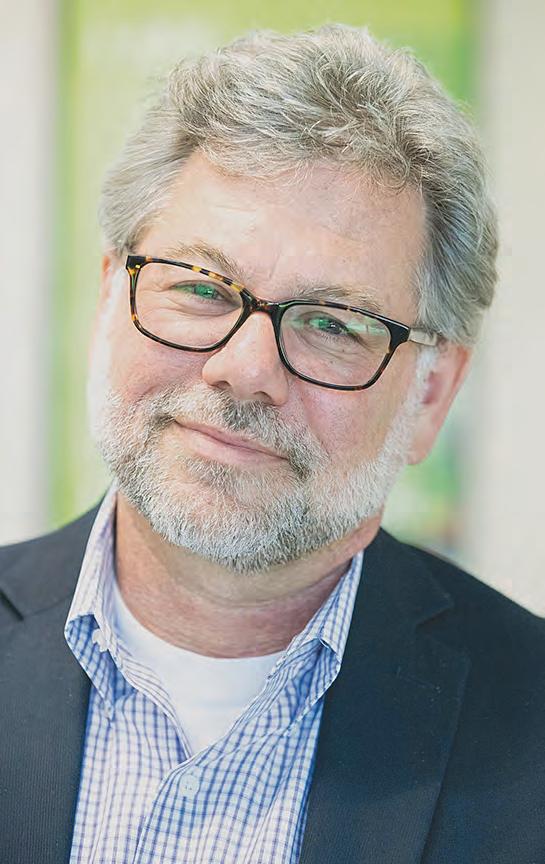
SETH BORNSTEIN
I met Alan Potash when I arrived in Omaha in the early 1990s. Diane and I had twin baby girls and lived in a small apartment in New York City. We needed space and help - moving to Diane’s hometown provided both. Soon after our move I joined the JCC. Poking around the building, I noticed the Jewish Cultural Arts office, knocked on the door and met Beth Seldin Dotan. I mentioned missing the movie scene in New York City where a few new Jewish films had just opened, and I bemoaned the fact that they would probably never get to Omaha. She asked if I would like to chair the Jewish Film Festival. I replied that as the father of twins I was quite busy, but happily accepted

the offer. She then said I must meet her friends Alan and Amy, as they too had recently become parents of twins.
A few weeks later, I was on my way to Beth’s office to discuss the film festival, when I noticed a couple wheeling their double stroller through the lobby. Beth saw us, came over and made introductions. Despite being bleary-eyed and exhausted in the way all parents of twins are, Alan and Amy See My friend, Alan Potash page 3
PHIL MALCOM
COO, Jewish Federation of Omaha
Last weekend I was reading the New York Times’s newsletter, The Morning, and I came across this quote about the change from summer to fall from Melissa Kirsch.
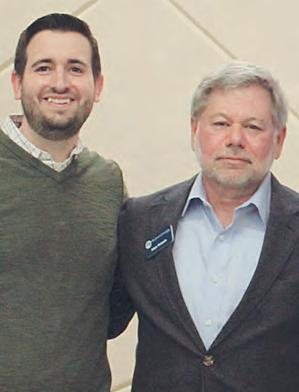
“The threshold between one season and another, between one moment and the next, between one way of being and the next one: There’s power there. If you can identify the demarcation and pause in it, you can turn your head one way and see where you’ve been, turn the other and see where you’re going.”
As we approach the High Holidays, we find ourselves in a similar moment of demarcation, separating one year from the next, the season before from the season after, the people we were from the people we are becoming.
During this time, I find myself reflecting on my friend, Alan Potash, who passed away September 22. I worked with Alan for nine years, and during that time he and I became quite close. He was my “work dad,” and his involvement in my professional journey is undeniable. He was a mentor, a guide, and a teacher. I took inspiration from his thoughtfulness, and I learned from him to be measured in my approach. Alan was insatiably curious, not just about the world around him but also about the people who surrounded him. Alan would often ask for my perspective on a particular issue or thought. At first I thought he was testing me, but later on I realized that he simply valued the opinions of others and wanted to gain perspective before making See Remembering Alan page 3


Continued from page 1 superpower magical relationship. They haven’t had as much time or desire yet to heal the world, but they saw Alan doing it every day. I know now that they will carry on this torch. They so respected their papa for this.
Alan was an introvert and thinker; but oddly, he was an introvert in extroverted roles that forced him to interact with others to accomplish his vision and commitment. He sacrificed his hunger to be quietly thinking and reading in his chair, formulating ideas for his next Shabbat e-mail blast, his next podcast, or conversation with his boys, theories and ideas to write about. He couldn’t find a job that allowed him to do just that, so he committed himself to making the Jewish world a better place through his work at JCC, ADL, and Jewish Federation. Alan would do anything for anyone, often at the expense of himself. He helped others with zero selfishness. He would often question me curiously if I hesitated to help someone. It was never a question – he didn’t have a territorial bone in his body.
nity in many places. He spread this love and growth of Jewish community in all the places we have lived and planted roots; from West Lafayette, IN (Purdue U), Champaign, IL (UIUC), Austin, TX (ADL), Omaha (JCC, JFO) to Palm Springs. He has touched the soul of Palm Springs and wasn’t done yet. He studied, researched, read, taught, whatever he could to educate others about Judaism and Israel.
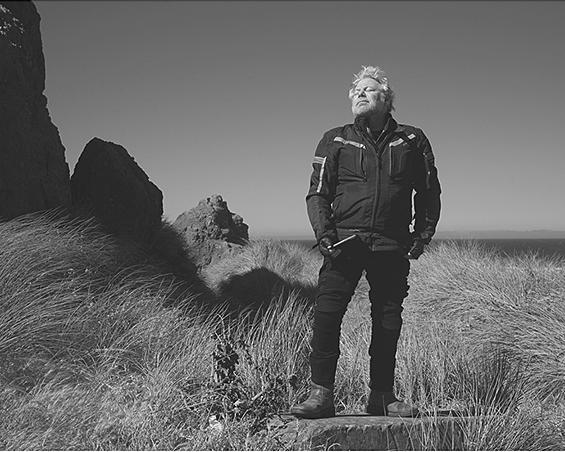
We all came to desire his Shabbat Drashes – no one touched your heart quite like Alan’s meandering but completely intentional lessons for all of us. His commitment to Judaism was his own; he never imposed any of his rules on others.
We shared full careers together, always supporting one another. He often commented on my work, how I engaged with others with energy in a way that was so different from him. We respected each other’s styles of working, what each contributed and how we approached our work.
By the time this is in your hands the massacre of Oct 7, 2023 will be a year in the past. Hopefully the hostages are free and war will be over. If not, there are still hostages in captivity and the devastation of lives is still all around. The deaths of the six hostages in early September are still fresh in the hearts of many.
The brutality and cruelty demonstrated by Hamas over the past year, the constant rockets from Hezbollah in the North and the blindness or indifference of the world is beyond belief and explanation. The rise of antisemitism and hatred towards Jews and Israel is hard to explain let alone understand.
9-10
March 19-20
October 8-9
October 12 -13
ADM.
MID-AMERICA CENTER
COUNCIL BLUFFS, IA Sat. 9-5 & Sun. 10-4
Where You Can Buy
Alan and I have a long history of courting that was somewhat unusual. We knew we were meant for one another right away, but were both too stubborn to admit it. We had several “near miss” collisions that said, we’re not quite ready yet for this journey together. But: we did find one another again, fell in love in a heartbeat, and were together for 34 years.
Quality Handmade Affordable Products and Over 20 Food Vendors
Where You Can Buy That Quality
Product At An Affordable Price.
Product At An Affordable Price.
Garden Art, Oak Furniture, Paintings, Ceramics, Jewelry, Metal Art Sculptures, Pet Products, Etched & Stained Glass, Yard Art, Pottery, Blown Glass, Candles, Clothing, Floral Wreaths, Toys & Dolls, Baskets, Rugs. Glassware. Purses. Ornaments, Food and Many More Original Products. All Handmade by the exhibitor.
Garden Art, Oak Furniture, Paintings, Ceramics, Jewelry, Metal Art Sculptures, Pet Products, Etched & Stained Glass, Yard Art, Pottery, Blown Glass, Candles, Clothing, Floral Wreaths, Toys & Dolls, Baskets, Rugs. Glassware. Purses. Ornaments, Food and Many More Original Products. All Handmade by the exhibitor. Callahan Promotions, Inc. 563-652-4529
Garden Art, Oak Furniture, Paintings, Ceramics, Jewelry, Metal Art Sculptures, Pet Products, Etched & Stained Glass, Yard Art, Pottery, Blown Glass, Candles, Clothing, Floral Wreaths, Toys & Dolls, Baskets, Rugs. Glassware. Purses. Ornaments, Food and Many More Original Products. All Handmade by the exhibitor.
Since Oct. 7th the anti-Israel voices have been following Hamas’s and Iran’s psychological warfare attacks through propaganda, violence and persistent hatred of Jews and Israel. College campuses, city councils and school boards are being inundated with misinformation and protests calling for actions against Israel. Natan Sharansky’s 3 Ds of antisemitism ring true with all of these calls. The three Ds stand for delegitimization, demonization, and double standards, each of which, according to Sharansky, indicates antisemitism. Jewish students are feeling pressure to take sides in this conflict; side against Israel to be accepted.
Callahan Promotions, Inc. 563-652-4529
Callahan Promotions, Inc. 563-652-4529
Callahan Promotions, Inc. 563-357-1986
He loved me with all his heart, unconditionally. I had never met anyone like Alan in my whole life. All I needed to be was myself. All the boys needed to be were themselves. He and I had the same theory about raising them: feed them, clothe them and then let’s just move out of the way.
Callahan Promotions, Inc.
Callahan Promotions, Inc.
Callahan Promotions, Inc.

Alan loved the boys’ zest for life, their exuberance to create themselves every day. He was in awe of them, and so fiercely proud of their accomplishments, who they know, how they bring people together. Really, this is just what Alan did. He never wavered in his confidence for what they are creating together and will create together. There was never a doubt in his mind that they will be amazing, and successful as entrepreneurial artists. He was in awe of their drive, uniqueness and hunger to show the world who they are. He lived to hear every story, every event, every idea they shared. He talked or texted with them every day and researched whatever they were doing, who they were meeting, for the sole purpose of having meaningful conversation about their experiences. And, he helped explain me, their mother, to them –why I would behave the way I did and why I behave the way I do. But again, no judgments... ever. Alan would want them to continue the path they are on, as if we had anything to say about it. Alan was truly committed to us.
Welcome to 5785. As we approach the High Holy Days this year many of us are concerned about where we are as Jews in the world. As a professional Jewish Leader, this year has been the hardest of my career. I will spend significant time this year reflecting and writing on my connection to Judaism and Israel.
After spending time in Israel this summer, I explored the diverse and complex world of Jewish Peoplehood. Several years ago former President of Israel Reuven Rivlin defined Israel as four “tribes”. Rivlin outlined four key sectors or “tribes” that comprise Israeli society: secular Jews, national religious Orthodox Jews, ultra-Orthodox Haredi Jews, and Arabs. These tribes have changed since October 7th and even earlier with the Judicial reform movement.
As I spent time sitting in cafes in Mahane Yehuda (Jerusalem’s open air market) watching the throngs of people, I realized the diversity of Israel is much greater than these four tribes. And many of these tribes do not integrate with each other. Looking at the diversity of Israel I asked myself, where do American Jews fit in. Where do I fit in? Also, not just in Israel but in the ever changing American Jewish landscape. Do you know where you fit in?
Shana Tova, may you have a sweet, healthy and prosperous year.
Ed. note: the above was the last story written by Alan for the Jewish Federation of the Desert in Palm Springs. We thank the JFD for sharing it with us.
Alan and I shared a love of Israel, our home. Alan’s spiritual and physical happy place is Israel. Yes, we moved to Palm Springs to be closer to the boys and do meaningful work of course, but the real reason he loved Palm Springs was that it was a little slice of Israel – the desert, the heat, the mountains – the feel of Israel.
Knowledgeable in a very comprehensive way about Israel, he was often sought out for his views and perspective on Israel. His unwavering commitment to building Jewish commu-
He was a difficult soul too. Alan was irritated by smells, sounds, textures that were not comfortable to him. Although he didn’t impose his unique rules about these things on others, he wasn’t shy about it either. During our first date, when my love for Patchouli was part of my identity, he had no issues at all telling me I was stinky and said he couldn’t be around this smell. It was not me, but the smell. This behavior was a theme throughout our 34 years together. I had to help him understand others might be offended by his quirks and tried to help with his abrupt social skills, and he did make improvements. But this was part of who he was. He would say that he was born with special requirements that made him hyper-sensitive. Looking clean and buttoned up was important to Alan: blue shirts, white shirts, dark blazers. He wouldn’t dream of wearing sweatpants anywhere for fear that he wouldn’t be a good representative of the community.
Alan loved art; photography, papermaking, art education. He adored his best friend, Jimmy Krantz for many reasons, but Alan especially loved watching Jimmy’s artistic brilliance. Jimmy was an inspiration to Alan artistically. He loved talking with him about it and supporting him.
More than likely, as another pathway to connect with Jimmy and his new friends, he also shared a newer passion for motorcycles; He looked forward to his trips with his biker buddies. It was so out of Alan’s typical lifestyle, but he loved it and moved at his own pace. Again, this was his way to connect with others more deeply.
We loved Israel together. We loved our home in Palm Springs together. We shared such a deep love for our boys together, sharing our lives with them in Palm Springs. What a gift these past two years have been for the four of us. We shared the love of cooking good food and relaxing at night watching our shows together. Alan loved his scotch; he tried to convince me when we first met, when he pulled out a flask, that this was only for medicinal, first aid purposes. Scotch was a metaphor for Alan in life and allowed him to relax his mind while enjoying the taste.
I will love you forever, sweet Alan Potash. My partner, my love, for 34 full incredible years of life. Sweet journey to you. Please don’t go too far and let us know when you’re with us.
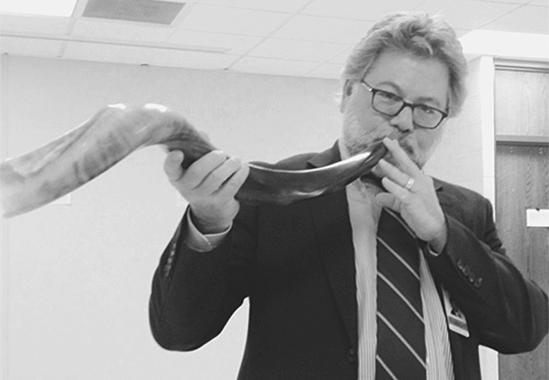
Continued from page 1
decisions. Alan rolled my own career development out carefully and slowly, giving me opportunities to stretch myself while also giving me the space and time to learn as I went. I’ve come to appreciate this deliberate pacing as I’ve grown older, knowing that Alan’s approach was designed to give me the best possible opportunities at just the right times. He and I of course bonded further as I prepared to be a father to twins. He used to tell me stories of parenting twins. He’d ask how things were going or see a picture and suddenly launch into a vivid memory of Adeev and Ezra as toddlers tearing apart a room. I’m not sure if the intention was to comfort me or scare me, but I felt connected to him regardless. One of my favorite memories of Alan was meeting up with him at the Jewish Federations of North America (JFNA) Board of Trustees meeting in New York. It was my first major introduction to JFNA, and I was completely out of my depth. Alan was the CEO in Palm Springs at the time, and I thought he might be there. On a whim, I texted him to see if he was at the conference. He was there, and he immediately took me under his wing for the rest of the event. And of course, he wanted to see the twins, who had come with Laura to visit New York while I was there. Trekking across the city with a boss who had become a peer and friend but who I nonetheless relied on for advice and guidance was a unique joy. Alan was a steady hand who always had your back. And of course, Alan was one of the first people to call me and check in after my own father passed away. I’ve heard it said many times this week that Alan genuinely cared about people, and I know that firsthand.
At our board meeting this week, my friend Lisa Lucoff approached me to see how I was doing with the news. While we spoke, she told me, “I remember Alan coming before all of us and going to bat for you, telling us that you were ready for more.” Her words hit me like a rock. “I remember Alan going to bat for you.”
All week I’ve thought of that interaction, and this question lingers in my brain:
Who am I going to bat for?
See Remembering Alan page 4

Continued from page 1 were charming and funny. Before leaving we had a vague conversation about getting together sometime. I went home and mentioned to Diane that I met this really cool couple with twin boys.
Often when couples meet socially for the first time, one of two things happen. The first is after fifteen minutes of small talk everyone realizes they have nothing in common. Or, one of each pair hits it off and maybe they’ll plan a lady’s lunch or a beer for guys. But remarkably a third thing happened – the four of us truly liked each other! It turned out we had a lot in common besides our lack of sleep in parenting twins. They had travelled around and came back to Alan’s hometown to raise their sons; they liked the arts and were literary; and they too had a mixed-marriage – by that I mean Alan and Diane were “of Omaha.” Amy and I were not “of Omaha.” And yes, there are differences!
It wasn’t long before we were regularly invited to their home. Our daughters, Madeline and Kerry adored Ezra and Adeev. They made them their little twin brothers and when we visited, all four went off to cause joyful havoc. Over Shabbat dinners and Sunday brunches we met the Potash and Nachman families and were made to feel like mishpocha. The food was always wonderful (Alan’s mother Ruthie’s gravlax!), the mood informal, and conversation that ranged from high intellectual to goofy and silly. Alan was surprised to learn that I had never seen Mount Rushmore, so at his suggestion our families did a road trip to South Dakota. We rented cabins, saw the great faces, the buffalos and the Badlands. In our living room we still have one the best family portraits of us taken by Alan in front of Mount Rushmore. He framed and matted it using paper he made.
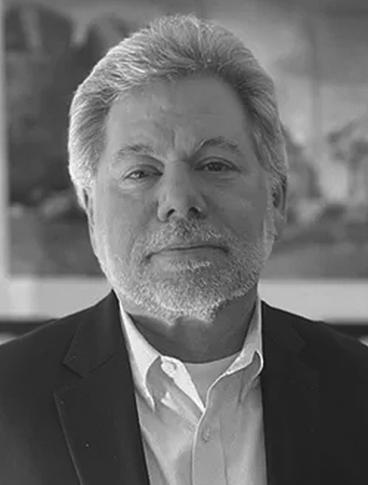
Early on it was clear to me that Alan was one of the smartest guys I had ever met. Many people have a bit of knowledge in some areas. But Alan knew so much about so many things: art, books, current events, music. I was humbled by his intelligence and curiosity. While we both shared a love for Judaism and Israel, his knowledge was so much sharper and insightful than mine will ever be.
In the late 1990s our families moved away from Omaha for career reasons. We hoped to keep in touch but realized it’s hard with the demands of child rearing and new jobs. But Alan’s work with Hillel frequently took him to New York and our home became the official NYC Potash/Nachman pied-a-terre. When Alan took on the ADL position in Omaha, we made sure to see him and Amy when we visited Diane’s family. Alan always got me a pass to the pool at the JCC and we’d try to have lunch afterwards though he was often very busy. “I have a committee meeting that’s done by twelve. We can have a quick bite, but
I have to leave at one for a Nazi rally in Lincoln,” he’d say matter-of-factly. When Ezra and Adeev entered college in New York we saw a lot more of them. Whenever the boys had a gig Alan and Amy invited us to join them. Alan was so proud of their achievements at such a young age, but never boasted or bragged. I think he was in total awe – as many of us were. One afternoon I came home to the Potash Twins giving the Bornstein Twins a pep talk on going after what you want. Who needed to listen to a motivational podcast when you had the Potash Twins in your living room? I knew where their smarts and motivation came from.
When I was writing a novel that encompassed Judaism and Israel, I needed advice and turned to Alan. He helped me and recommended others who could help me, too. When it was published, I didn’t know if Alan had read it, though I desperately wanted his verdict as his opinion mattered to me – more than many others. Early this year he and Amy were in New York. It was an oddly warm winter night, and I suggested we sit out on the terrace and have a Scotch. As we sipped our drinks, he told me he just finished my book and how much he liked it. His approval meant everything to me. Near the end of the service last week one of the speakers, in eulogizing Alan, spoke of the Lamed Vav Zaddikim, the 36 anonymous righteous ones who keep the world in balance. Thinking of Alan hearing himself being compared to a Lamed Vavnik, I visualized that wry smile on his face making a witty, but self-deprecating remark, and it gave me a momentary bit of joy before being enveloped with the sadness that has been with me since his passing. For the truth is we will all be a little unbalanced without him in our world.

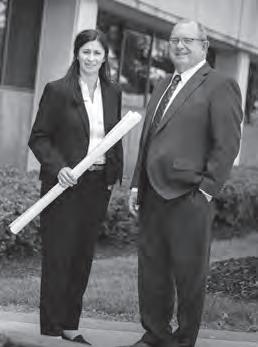
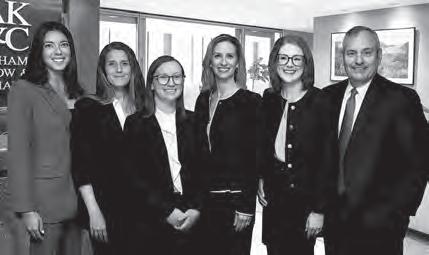
At AKC Law, we know that earning trust doesn’t happen overnight. That’s why we've been working hard to build long-term partnerships with our clients since 1944. Our attorneys combine years of experience with passion and creativity to provide you with the highest quality legal advice in business law, litigation, and trusts & estates.



















ANNETTE VAN DE KAMP-WRIGHT Jewish Press Editor
Among the approximately 20,000 American soldiers who trained at Camp Ritchie during WW II, there were some 2,000 Jewish refugees, mostly from Germany and Austria. They had escaped Nazi persecution in Europe, and many of them trained as prisoner-of-war interrogators. They were fluent in the German language, and had detailed knowledge of German culture and customs, which made them perfect candidates for the job. From a place of safety in the United States, they ended up serving in Europe, but this time in an American uniform.
“Ritchie Boys” became the name used for those training at Camp Ritchie, but only after the war. In 2004, German filmmaker Christian Bauer released a documentary called
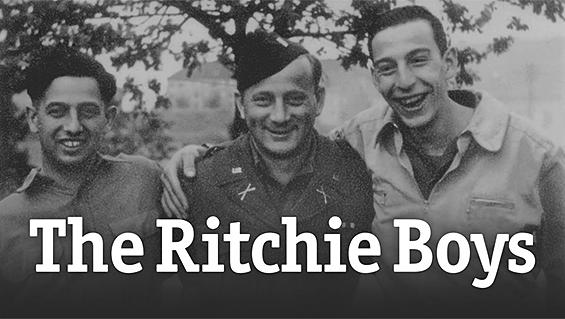
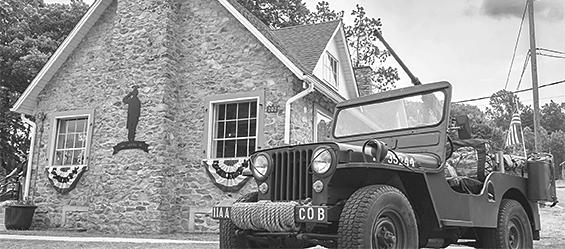
The Ritchie Boys, after which the name stuck. The film will be shown by the Institute for Holocaust Education on Nov. 7 at 7 p.m. in the Alan J. Levine Performing Arts Theater at the Staenberg Kooper Fellman JCC. Admission is free.
On Feb. 3, 2025, the Director of the Ritchie History Museum, Katy Self, will visit Omaha. Self is a graduate of the University of South Carolina in Columbia, where she received her bachelor’s degree in anthropology. She received her Master of Arts in Museum Studies with a Post-baccalaureate Certificate in Digital
Curation from the Johns Hopkins Advanced Academic Program. For nearly a quarter of a decade the building which houses the museum was empty and abandoned. Thanks to a variety of state funding, grants, and private donations, the Ritchie History Museum finally found its home in 202 Barrick Avenue. Built between 1932-1934 as the Brigade Officers mess hall, it was later dedicated as a memorial library to the man who designed Ritchie, Robert Barrick. Thanks to funding from the National Endowment of Humanities through Maryland Humanities, our museum has been able to create a digital archive of thousands of documents relating to Camp Ritchie and Fort Ritchie’s long history connected to both Maryland History and Military History. Check out our archive and digital space to learn more about our historically unique property.
Finally, on March 2, 2025, Aaron Parsow, son of Margo and Jay Parsow, z”l, will speak about his grandfather, Warner B. Frohman, who was a reallife Ritchie Boy. A display with items brought back by Frohman will be curated for our community by the Nebraska Jewish Historical Society. Our museum has been able to create a digital archive of thousands of documents relating to Camp Ritchie and Fort Ritchie’s long history connected to both Maryland History and Military History. Check out our archive and digital space to learn more about our historically unique property.
Continued from page 3.
We’ve all been the beneficiaries of someone lifting us up. We’ve all grown because someone else used their influence to shape us, to teach us, and to give us opportunity. What do we do with these gifts?
I miss my friend greatly, and in this moment of transition from one year to the next, from a time when he was just a text away to a world where that is no longer the case, I know that I can honor him by sharing the gifts he gave me, by going to bat for the people around me, by caring so deeply that everyone can feel it.
It’s my hope for you as we start the new year that you have the space to “turn your head one way and see where you’ve been, turn the other and see where you’re going,” to take a minute to appreciate the people who have brought you to this specific moment, and to honor those legacies in the way you go to bat for others.
Shana Tova and Shabbat Shalom
The family will be creating an endowment to honor Alan’s life and legacy in the Omaha Jewish Community. Donations can be sent to the Jewish Federation of Omaha Foundation in memory of Alan Potash.
B’NAI B’RITH BREADBREAKERS
The award-winning B’NAI B’RITH BREADBREAKERS speaker program currently meets Wednesdays via Zoom from noon to 1 p.m. Please watch our email for specific information concerning its thought-provoking, informative list of speakers. To be placed on the email list, contact Breadbreakers chair at gary.javitch@gmail.com
JEWISH PRESS NOTICE
The Jewish Press will be closed on Thursday Oct. 17 for Sukkot. The deadline for the Oct. 25 issue, it is Monday, Oct. 14, 9 a.m. Questions? Call 402.334.6448.
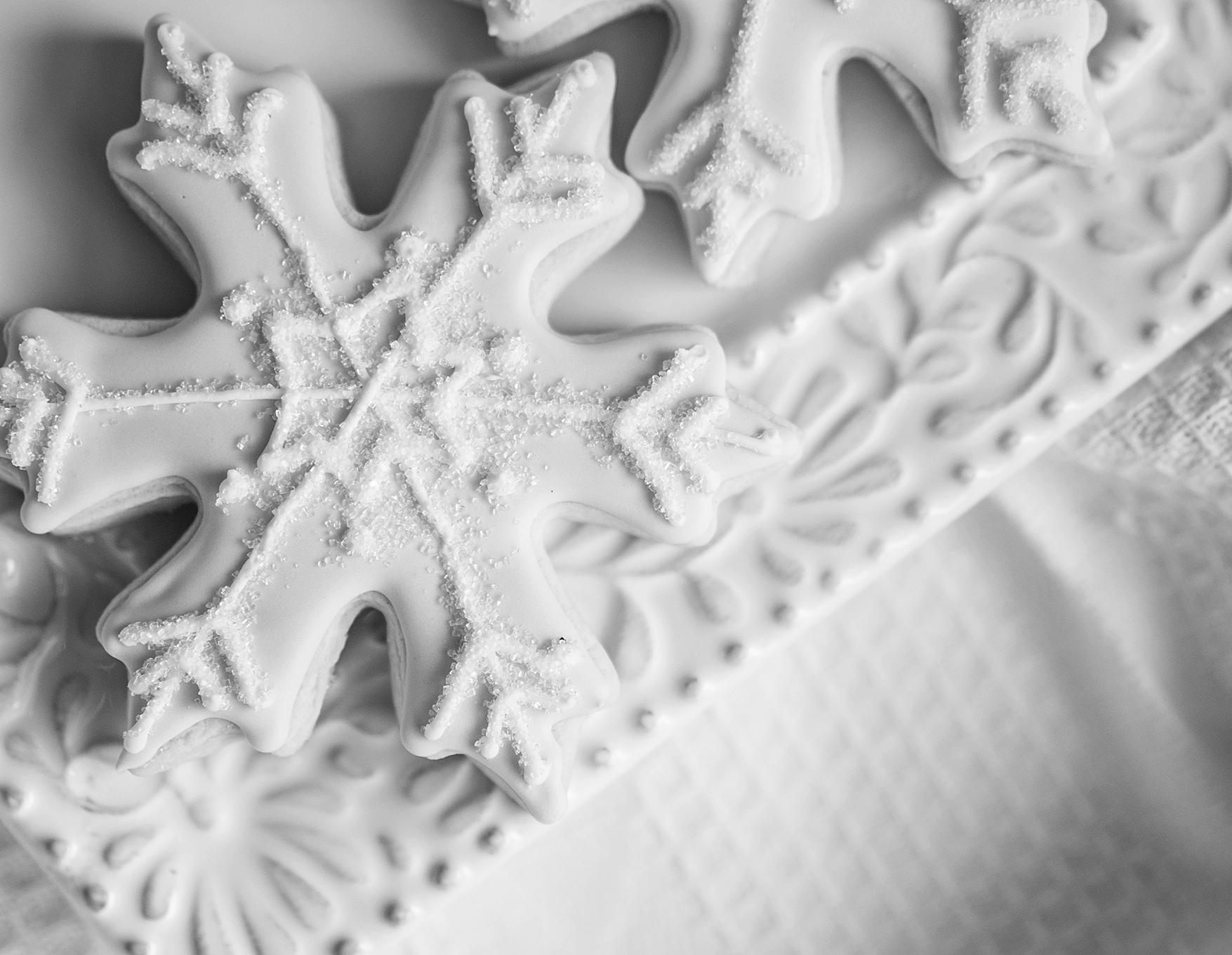


ANNETTE VAN DE KAMP-WRIGHT
Jewish Press Editor
What’s hiding in the archives of the Nebraska Jewish Historical Society? That is an excellent question, and since we don’t all have time or opportunity to go look for ourselves, we’ll show you some of it here from time to time.
The owner of the cadet uniform pictured was Arthur M. Parilman, who died in October of 1991. After his passing, his wife, Dorothy, donated the uniform to the NJHS. From 1937 to 1941, Arthur was a cadet at Central High School. The NJHS keeps the uniform safe in an archival box, wrapped in archival tissue paper, and stored in the climate-controlled basement storage room.
The Military Science program at Omaha Central High School predated the JROTC program. It began during the 1892–1893 school year and became the most popular activity at the school. Initially, all male students were required to participate and were organized into military companies.
lish and display materials which pertain to the family, business and social histories of the Jewish community of Nebraska and Council Bluffs. The NJHS is an agency of the Jewish Federation

The Nebraska Jewish Historical Society was founded in 1982 by Mary Arbitman Fellman and Oliver Pollak to collect, pub-

of Omaha. For more information, please visit our website at www.nebraskajhs.come, or contact Executive Director Jane Rips at jrips@jewishomaha.org and Director of Archives and Collections Jennifer Garza at jgarza@jewishomaha.org
JFO Community Engagement and Education
Beit Midrash is characterized as a place of study and enjoys an energetic atmosphere with free-flowing discussion and learning. Our Omaha community-wide Beit Midrash began in 2019 and is starting up again on Nov. 6. Beit Midrash clergy and community members alike are looking forward to meeting and learning together. Sessions will be the first Wednesday of each month beginning in November and extending through June. During every Beit Midrash, a different clergy member from our community synagogues will select and present a pertinent topic of
Presenting
Date Time Clergy
Nov. 6, 2024 1:30-2:30 p.m. Beth El
Dec. 4 Noon-1 p.m. Temple Israel
Jan. 8, 2025 Noon-1 p.m. Chabad
Feb. 5 Noon-1 p.m. Temple Israel
Mar. 5 Noon-1 p.m. Beth Israel
Apr. 2 Noon-1 p.m. Beth El
May 7 Noon-1 p.m. Chabad

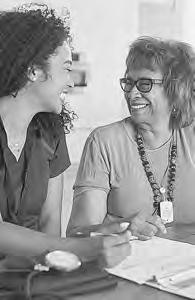


Jun. 4 Noon-1 p.m. Beth Israel ROOFING
There are two basic kinds of bris ceremonies in Israel. One will be familiar to American Jews: the bris as an “event.” Like other life-cycle ceremonies, this kind of bris will take place in a synagogue or a catering hall, attended by dozens and sometimes hundreds of family and friends. The blessings and format of a traditional Jewish circumcision ceremony will be used in this kind of bris, as will the services of a mohel.
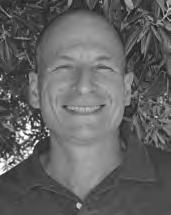
The other type of Israeli bris ceremony is rarely glimpsed by American Jews because it is an extremely private ceremony, attended only by close family members. This bris is performed in a private home (often, that of grandparents), always by a physician, preferably a surgeon of some kind, who has had additional training to be a mohel. If they are going to have a ceremony at all, this is the type of bris preferred by secular Israelis (some eschew all ceremony and just have the baby circumcised at a hospital or a doctor’s clinic). The program for this type of bris varies widely, with elements from traditional Judaism and contemporary Judaism utilized—or not—depending on the parents’ wishes. This was the type of bris that was held for my new grandson, Ori Shay, on Tuesday, Sept. 17. The bris was scheduled at the home of my mekhutanim, Ruthie and Nissim Shay, the parents of my son-in-law Nofar. When our daughter Ruthie (!!) told us that she was pregnant with a boy, there was no question in our minds that there would be an at-home bris. After all, when Ruthie and Nofar married four years ago, there were not many traditional elements in the ceremony, and since then the couple has led a secular lifestyle. You can imagine my surprise when, as we were shlepping in the food we had brought and the centerpiece that Sarah made, I saw that the physician/mohel was a religious man and that there was a large “Elijah’s Chair,” which Nissim had arranged to be brought from his nearby Yemenite synagogue. Who would have guessed? This was going to be a very traditional bris. I watched in astonishment as my son-in-law, at the mohel’s request, put on a talit and a kipa and dutifully recited all the lines of the father in the traditional ceremony. When I later asked Nofar about his willingness to go along with tradition at the bris,
their choice. Times are over the typical lunch hour; all sessions are held at the Staenberg Omaha JCC. See table for each session’s timing and presenting clergy. We are looking forward to an exciting year of study. In your browser, please navigate to jewishomaha.org, select the “Our Priorities” dropdown menu, and under “Community Engagement” select “Adult Jewish Education” for more information about Beit Midrash and to register. Please register for each session you plan to attend, as there will be Kosher snacks and beverages provided. With questions, contact Naomi Fox at nfox@jewishoma ha.org or 402.334.6424
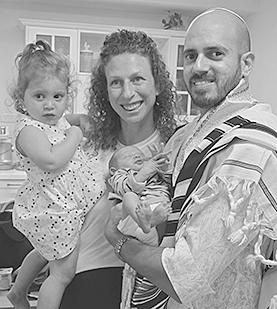
he told me “I did it for savta”— Nofar’s wonderfully clearheaded 98-year-old grandmother whom Nofar’s mother had convinced to come to the bris with her Indian caregiver. Nofar added, “Besides, “I had something bigger to worry about during the ceremony: I was concerned about the actual circumcision!”
Nofar and Ruthie had told me the day before that I would be honored with being the sandak, and given my assumptions as to the kind of bris I expected, I had wondered what this would entail, since many “modern” mohalim strap the baby to a small board. Wouldn’t you know it, just when I counted on Ruthie and Nofar’s secularism, they had me be a traditional sandak, physically holding the baby’s legs during the circumcision. While I didn’t dare look, I can tell you that it is not the most pleasant of experiences. Afterwards, though, as is traditional especially among Sephardim (all four of Nofar’s grandparents were born in Yemen), I sat on Elijah’s chair and gave blessings of health and happiness to everyone who came to me.
To conclude the ceremony, Ruthie spoke about how they came to choose the baby’s name: “When we called our daughter Gilly, we hoped she would be like her name, “my joy,” and this indeed happened. Gilly is a happy and friendly girl, saying hello to people on the street and making everyone smile. Then our baby arrived and we wanted a name that would add another layer to our lives, a name that we would need especially in this period of war, with a lot of difficulty and a darkness we did not know. This is why we named him Ori (“my light”), and we hope that he will spread light to our family and to everyone who meets him in the future. Welcome to the family, Ori. We have been waiting for you and all the light you will bring with you.”
Shana Tova!
Teddy Weinberger, Ph.D., made aliyah with his wife, former Omahan Sarah Jane Ross, and their five children, Nathan, Rebecca, Ruthie, Ezra, and Elie, all of whom are veterans of the Israeli Defense Forces; Weinberger can be reached at weinross@gmail.com.




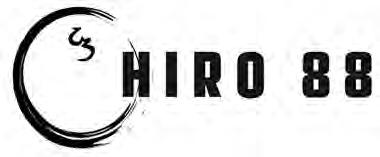
ANNETTE VAN DE KAMP-WRIGHT
Jewish Press Editor
Dr. Ron Wolfson is an acclaimed educator, organizational innovator and recent graduate of AJU’s Ziegler School of Rabbinic Studies, and an Omaha native. And: he loves being Jewish.
you experience antisemitism, there are ways to report an incident or hate crime:
the JFO’s Safety and Security Team 402-334-6446
EMAIL JCRCreporting@jewishomaha.org SCAN the QR code below to fill out the Incident Reporting Form
directly with law enforcement, Secure Communities Network, and the Anti-Defamation League.
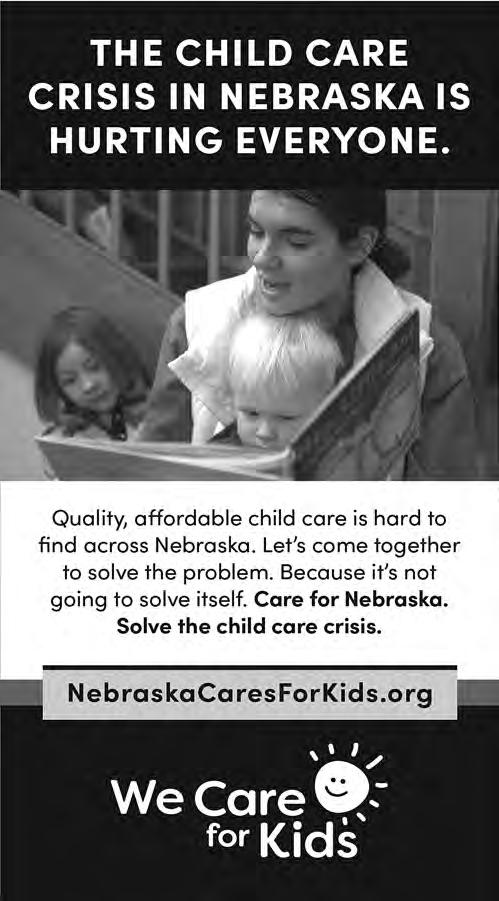
school education this past May and was ordained rabbi by the Ziegler School of Rabbinic Studies. It only took 55 years!”

“I love it all,” he said. “I began my own leadership journey in Omaha. I can remember the very first moment I even thought about becoming a leader. It was a late Sunday afternoon BILU USY (United Synagogue Youth) new member barbecue in the Youth Lounge of the old Beth El Synagogue. The Director of Education/Youth Director was a dynamic guy from Israel, Jack Molad. He stood up and regaled us kids with the exciting opportunities in the year ahead. He called on us to get involved, to lead a committee. I was chosen to be the Regalia Chairman, in charge of pins and swag. In the next three years, I was elected Chapter President, EMTZA Region Vice President, and in my senior year, Regional President. I guess you can say I was hooked on leadership, passionate about motivating and inspiring my peers to love Shabbat, holidays, Jewish learning, and tikkun olam - social justice projects.”
American Jewish University (AJU) recently announced the release of Jewish Communal Leadership: Lessons Learned from Leading Practitioners, Ron’s latest book. Published by the Kripke Institute, this essential resource addresses the leadership challenges of building thriving Jewish communities and institutions now and in the future.
It’s not his first. Over the years, he’s published a variety of texts on Jewish life and learning. From Relational Judaism, to Be Like God: God’s to-do List for Kids, and of course The Seven Questions You’re Asked in Heaven. What motivated him to publish this latest book?
“In Jewish Communal Leadership,” Ron said, “I asked Rabbi Denise Eger, a pioneering Reform LGBTQ rabbi, this very same question: ‘If there is one action for a leader to role model, what would it be?’ Her answer would be my answer: ‘Lifelong learning... to stay inspired to lead a Jewish space that is constantly evolving and constantly challenging.’ I love to learn. And, I love to teach. I am honored to continue the legacy of Rabbi Myer and Dorothy Kripke through the Kripke Institute’s Center for Relational Judaism which has published this volume. It is an extension of my classroom, enabling many people to share what I have learned about leadership from the wonderful leaders I had the privilege to interview. Speaking of lifelong learning, my plan was to become a rabbi when I left Omaha for college. In fact, I was first accepted to rabbinical school in the summer of 1969. I am proud to say I completed my rabbinical
The vitality of Jewish communities and institutions depends on the visionary leadership of both professionals and lay leaders. Dr. Wolfson’s book addresses this critical need by offering a comprehensive and interactive guide for leaders working to build strong, forward-facing Jewish communities and institutions. The book features nine in-depth interviews about lessons learned by top leaders from a diverse array of Jewish organizations—including Federations, Jewish Community Centers, synagogues, day schools, Hillels, foundations and more.
Jewish Communal Leadership is designed as an interactive volume and proves to be an invaluable tool for leadership teams.
The book includes discussion questions that focus on the practical application of the content, where no topic is off-limits.
“Together with my student and colleague, Jason Goldman,” Ron said, “we designed the book to be used with boards and staff as a ‘community read.’ When a group reads this book together and digs into the discussion questions at the end of each chapter, everyone on your team will literally “be on the same page,” empowered to use the many takeaways in the book for everyone’s own personal leadership work and to align with the vision and mission of the organization.”
He hopes readers come away with inspiration to continue their work in serving the Jewish community.
“Every volunteer, every Jewish professional, devoting their time, talent and treasure to build our communal institutions,” he said, “is doing sacred work. Whether in the synagogue, the JCC, the Federation, the Foundation, a day school, a youth group, or any other organization, everyone needs to be inspired. Zack Bodner, the CEO of the Oshman Family JCC in Palo Alto, California, said during our interview: ‘The CEO needs to be the CIO - the “Chief Inspiration Officer.’ I agree 100%. I hope every reader who comes away from these noholds barred, honest, insightful and moving interviews will be inspired to be the best leaders they can be.”
That’s all well and good, but when is he coming for a visit, so our community can catch up, and hear directly from him?
“Of course, my wife Susie and I always love to visit Omaha,” he said, “but we have no plans at the moment. I can say this: during the 50 years I have traveled the world from my base at American Jewish University to share what I have learned, I have rarely encountered a community like Omaha with leaders so devoted to building and supporting outstanding communal institutions to serve the Jewish people. You know what they say, ‘There is no place like Nebraska.’ And it’s true! You can take the boy out of Nebraska, but you will never take Nebraska out of the boy!”
Dr. Ron Wolfson is the Fingerhut Professor of Education at American Jewish University in Los Angeles and President of the Kripke Institute.
For more information or to purchase Jewish Communal Leadership: Lessons Learned from Leading Practitioners, please visit jewishleadershipbook.com





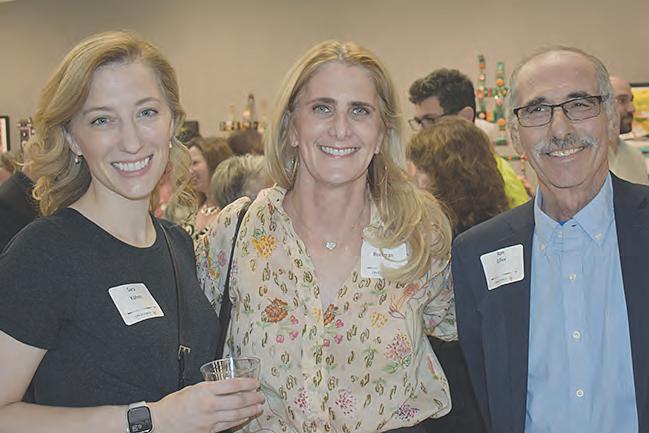
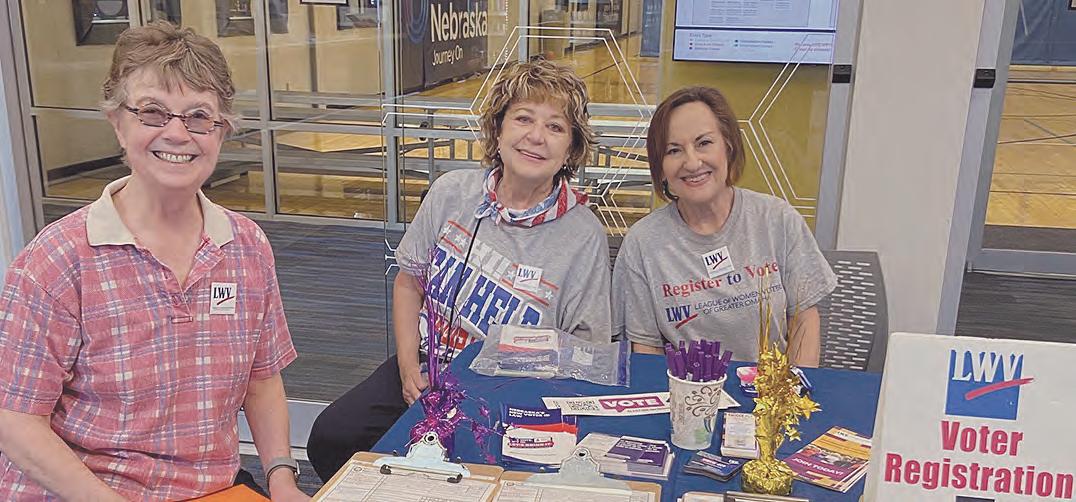

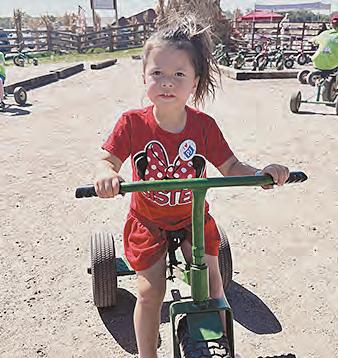

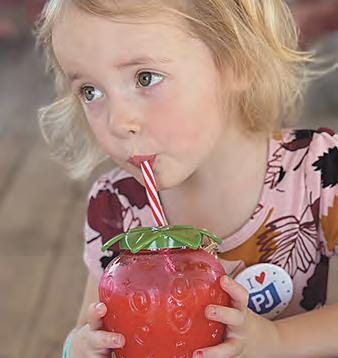

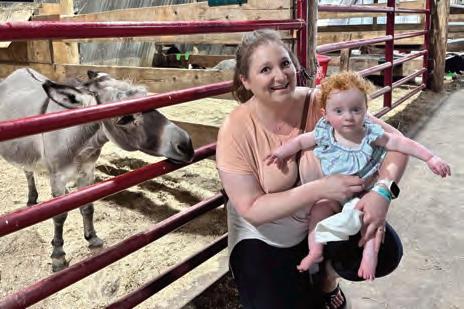
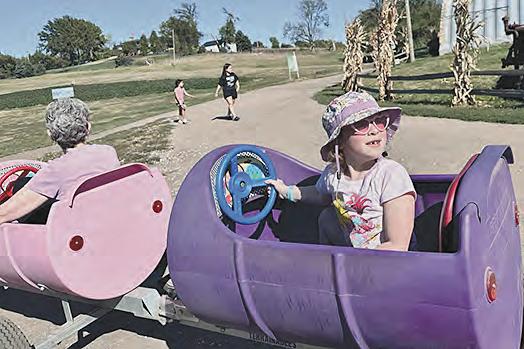

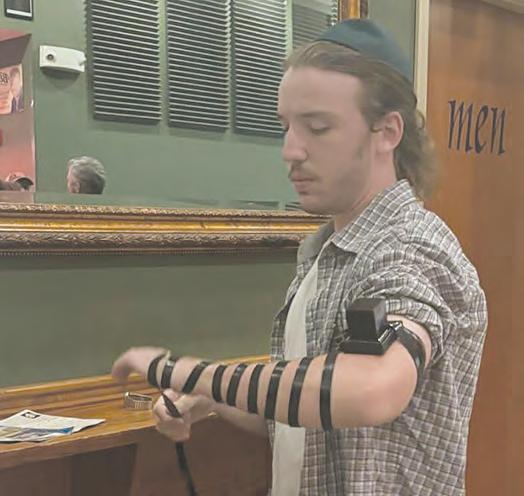
(Founded in 1920)
David Finkelstein
President
Annette van de Kamp-Wright
Editor
Richard Busse
Creative Director
Claire Endelman
Sales Director
Lori Kooper-Schwarz
Assistant Editor
Melanie Schwarz
Intern
Sam Kricsfeld
Digital support
Mary Bachteler
Accounting
Jewish Press Board
David Finkelstein, President; Margie Gutnik, Ex-Officio; Helen Epstein, Andrea Erlich, Ally Freeman, Dana Gonzales, Mary Sue Grossman, Hailey Krueger, Chuck Lucoff, Larry Ring, Melissa Schrago, Suzy Sheldon and Stewart Winograd.
The mission of the Jewish Federation of Omaha is to build and sustain a strong and vibrant Omaha Jewish Community and to support Jews in Israel and around the world. Agencies of the JFO are: Institute for Holocaust Education, Jewish Community Relations Council, Jewish Community Center, Jewish Social Services, Nebraska Jewish Historical Society and the Jewish Press Guidelines and highlights of the Jewish Press, including front page stories and announcements, can be found online at: www.jewishomaha.org; click on ‘Jewish Press.’ Editorials express the view of the writer and are not necessarily representative of the views of the Jewish Press Board of Directors, the Jewish Federation of Omaha Board of Directors, or the Omaha Jewish community as a whole. The Jewish Press reserves the right to edit signed letters and articles for space and content. The Jewish Press is not responsible for the Kashrut of any product or establishment.
Editorial
The Jewish Press is an agency of the Jewish Federation of Omaha. Deadline for copy, ads and photos is: Thursday, 9 a.m., eight days prior to publication. E-mail editorial material and photos to: avandekamp@jewishomaha.org ; send ads (in TIF or PDF format) to: rbusse@jewishomaha.org
Letters to the Editor Guidelines
The Jewish Press welcomes Letters to the Editor. They may be sent via regular mail to: The Jewish Press, 333 So. 132 St., Omaha, NE 68154; via fax: 1.402.334.5422 or via e-mail to the Editor at: avandekamp@jewishomaha.org.
Letters should be no longer than 250 words and must be single-spaced typed, not hand-written. Published letters should be confined to opinions and comments on articles or events. News items should not be submitted and printed as a “Letter to the Editor.”
The Editor may edit letters for content and space restrictions. Letters may be published without giving an opposing view. Information shall be verified before printing. All letters must be signed by the writer. The Jewish Press will not publish letters that appear to be part of an organized campaign, nor letters copied from the Internet. No letters should be published from candidates running for office, but others may write on their behalf.
Letters of thanks should be confined to commending an institution for a program, project or event, rather than personally thanking paid staff, unless the writer chooses to turn the “Letter to the Editor” into a paid personal ad or a news article about the event, project or program which the professional staff supervised. For information, contact Annette van de Kamp-Wright, Jewish Press Editor, 402.334.6450.
Postal
The Jewish Press (USPS 275620) is published weekly (except for the first week of January and July) on Friday for $40 per calendar year U.S.; $80 foreign, by the Jewish Federation of Omaha. Phone: 402.334.6448; FAX: 402.334.5422. Periodical
Editorials express the view of the writer and are not necessarily representative of the views of the Jewish Press Board of Directors, the Jewish Federation of Omaha Board of Directors, or the Omaha Jewish community as a whole.
ANNETTE VAN DE KAMP-WRIGHT Jewish Press Editor
Although several people recommended the new Netflix show Nobody Wants This, I was reluctant to watch it. Of course, I ruined it for myself by first reading a number of reviews, making me believe I sort-of knew what to expect.
“Created by Erin Foster and loosely based on her life experience, Nobody Wants This portrays Rabbi Noah Rocklov (Adam Brody) meeting Joanne (Kristen Bell) at a mutual friend’s party in Los Angeles. He hopes there’s a Jewish link, asking: “Are you even a little bit Jewish? Like an aunt, or a great grandmother, or a forged document?” While their backgrounds and families couldn’t be more culturally different, the connection between them is undeniable,” Keren McGinity wrote for the JTA.
The cringe moments several reviewers warned me about were there: the frequent use of the word “Shiksa,” the overbearing mother, the bossy sisterin-law, the tiresome ex-girlfriend. The line: “Share the real you; it’s not dangerous anymore.” The way Rabbi Noah is suffocated by his congregants after the Friday night service, trying to introduce him to their daughters. It’s all a little much.
And then, near the end of the second episode, I turned it off. I’d had enough. “Thank you,” my daughter said. She wasn’t enjoying it, either. And ever since, I’ve been wondering why.
It can’t be just the ‘cringe’ moments, it can’t be that I am so thin-skinned that I get irritated at every portrayal of a Jewish woman who is opinionated and loud. I can laugh at stereotypes portrayed
by Jewish actors when they are genuinely funny, I watched Borat and You Don’t Mess with the Zohan and even The Hebrew Hammer. What I can’t handle is laziness. And this show is lazy.
Two disclaimers: 1) I’m going to ruin this for you, so if you plan to watch it, you might want to stop reading and 2) I never did go back to watching the rest of the episodes. Maybe the characters redeem themselves later in the season; I wouldn’t know.
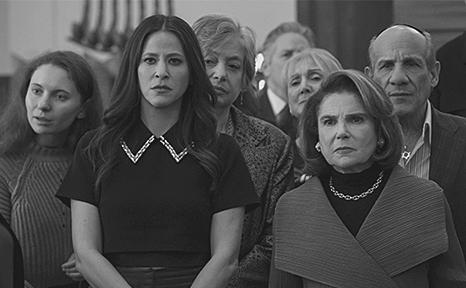
The main character, played by Adam Brody, is not only a rabbi, his rabbinic identity is front and center. That could be nice; we see him in shul and talking about his Judaism and why it is important. But we also see him swear and listen to a naughty podcast about sex and arguing with his family. He is flirty, and he goes out on Friday night, riding in a car after services. In short, he is human, and he is flawed, and that’s where the emphasis lies. As if a
rabbi who doesn’t break some rules is too boring for the audience. He must be a rabbi who is unrabbi-like (A Rabbi who knows the F-word? Oh my). Jewish, but not too Jewish.
“He doesn’t look Jewish,” Joanne’s sister texts, which then accidentally plays over the speakers while Noah and his brother are in the car with the two women. It’s one of those moments that is all too recognizable to many of us. And while the characters seem to call it out as uncomfortable, it still feels like they move on too quickly. It’s just one of many unpleasant microaggressions, which, I guess, serve to remind us ad nauseam that these two people are very, very different.
But it’s Noah’s parents who really get the short end of the stick. They are immigrants, Noah mentions in passing, and we can tell from their accents. That means they have a story. Where did they come from? How did they get there? What have their lives been like? What are their hopes and dreams? What do they fear? If that story comes out in a later episode, does it justify introducing them as stereotypical, overbearing, unlikable people who can’t see things from their son’s point of view? The show is current, Noah appears to be in his early 30s, did they come as Refuseniks? Or not? Who are they, really? If Noah isn’t comfortable with who his parents are, can we really say he is comfortable with his Judaism? I have so many questions. Maybe I should go back and watch the rest of it after all. But I don’t think I will. Perhaps I’m just too cranky about the hostages and the ongoing war and the 200 missiles Iran just sent over to give this show, or any show, an honest shot. That’s okay. I have a lot of books to read.
For a Jewish world in despair, High Holiday prayers need to meet the moment
ALEX WEISLER
Today, the Unetaneh Tokef’s age-old formula for how to handle hard times falls short, writes a JDC official who has seen Jewish life flourish amid catastrophe | JTA
I’ve spent the last year traveling the world — two trips each to Israel and Ukraine, along with time in Bulgaria, Ghana, Hungary, the United Kingdom, Georgia and beyond — and I have new eyes for the situation we Jews find ourselves in.
We face skyrocketing antisemitism, an agonizing war with Hamas and its allies, and the grim WhacA-Mole of so many other pressing concerns. And in early October, we’re somehow meant to endure a Jewish New Year that will force us to confront the chasm between our prayers and our reality.
Attempting to wrestle meaning from the daily pain so many of us have carried since Oct. 7, we’ll recite the Unetaneh Tokef, a medieval liturgical poem best known for the phrase “who will live and who will die” that also sneaks in an ancient formula for living through a spiritual hurricane.
“Prayer, charity and repentance can lessen the severity of the decree,” we belt out, but today, that age-old paradigm for how to handle hard times feels insufficient. With Jewish communities worldwide grappling with a discourse so black-and-white you could choke on it, we need more.
The father of two small children, I feel that imperative acutely. One year into this mess, my Jewishness, while lived proudly every day, feels smaller, sadder, more subdued. How can I raise my kids to be boldly and joyfully Jewish when we feel alone and unsafe in so many once-familiar spaces?
I began to find the answer in an unexpected place — the third floor of a lonely Khrushchev-era apartment building on the outskirts of Chișinău, Europe’s poorest capital.
I was in Moldova to meet 78-year-old Emilia Grosu, a widowed retired cook who ekes out a life on a meager fixed income with the assistance of my organization, the American Jewish Joint Distribution Committee, or JDC. She is among tens of thousands of poor and elderly Jews across the former Soviet Union we care for — people without anyone else to aid them.
As I cackled at her jokes and marveled at the ex-
uberant hospitality of someone with so little, our powwow turned to prophecy when we spoke of her struggles.
“The most frightening thing is when you’re sick. It’s not like I can ask for help from my neighbors — there are seven bedridden people in my building alone,” Emilia told me, jabbing a finger into the air for emphasis. “My only hope is our Jewish community. We stick together here.”
Her words echoed later during my months in Israel — where I visited the besieged Southern towns of Sderot and Ofakim, large cities like Be’er Sheva and Jerusalem, and communities in the North anxiously preparing for an escalation or full-scale war.
How much more so now, with our hearts aching under the shadow of existential questions we’d hoped were long behind us: What will be the fate of the Jewish people? Of Israel? And how can we return to a world — to social circles, friends, and oth-

In Tiberias, the erstwhile tourist hotspot that’s absorbed more than 10,000 evacuees, I attended a JDC prenatal class for women living through the unimaginable — wrenched from their homes for nearly a year, some with husbands in the military, with no idea when they’d return.
It’s one of scores of emergency initiatives we’ve launched in the months after Oct. 7 to meet the spiking humanitarian needs of the hardest-hit Israelis. We’ve directly aided more than 450,000 people to date, but millions more who never needed social assistance before are now relying on it to survive.
There, in the basement of a community center overlooking the Sea of Galilee, I listened in awe as a roomful of brave young women described their clear-eyed choice to create new life in displacement. I was inspired by their rejection of the temptation to let today’s despair engulf them.
“I feel focused and calmer, like I know what I’m heading into,” said Hadar Elmakayes, a 33-year-old evacuee from Kiryat Shmona, less than two miles from the Lebanon border. “When each one of us shares what she’s going through, it unites us and lifts our spirits.”
As Emilia and Hadar reminded me, crisis demands community. We Jews require a minyan — a quorum of 10 people — for our holiest and most tender moments. By ourselves, we can neither properly mourn nor read from the Torah, our most sacred text.
ers — who either can’t fully feel our pain or reject it outright?
It was with all this on my mind that I met Oleksandr Kyrychenko, a young Ukrainian who only learned he was Jewish after Feb. 24, 2022, when his country was plunged into a brutal conflict with no end in sight.
Already 30, he recited his first Shabbat prayers during a 15-hour blackout. His inaugural Purim was celebrated in a bomb shelter with internally displaced Jews from battered Chernihiv. That first Hanukkah, he lit the menorah as the air raid siren sounded. Now he serves as a counselor at our Superhero Camp in the Carpathian Mountains, an opportunity for Jewish families to get some respite, recharge their batteries, and rediscover their optimism and resilience. Along with the activities Oleksandr connected with as he rediscovered his Judaism, the camp is one facet of my organization’s sweeping response to the Ukraine crisis — just like the tens of thousands of Jews on our aid rolls and the more than 800 tons of humanitarian assistance delivered to meet their needs.
I asked Oleksandr what his trial by fire taught him about community. What do you learn about being Jewish when your only context is catastrophe? See A Jewish world in despair page 9
KEREN R. MCGINITY
A gender historian and scholar of intermarriage says she watched the “hot rabbi” show with apprehension | JTA
As a gender historian and scholar of intermarriage, I bingewatched the new Netflix series Nobody Wants This with a combination of foreboding and optimism.
Depictions of romances between Jewish men and Christian women have been ubiquitous in popular culture since The Jazz Singer in 1927 as Jewish men in Hollywood depicted their own lived experiences. Having analyzed popular culture over a century, I was concerned that I would see familiar tropes, but I also hoped that there would be some new take on a Jewish man falling in love with a woman of another faith background — a relatively frequent occurrence in real life that is overdue for a thoughtful on-screen revision.
Both my concern and my hopes were fulfilled. I was also pleasantly surprised by what I saw.
Created by Erin Foster and loosely based on her life experience, Nobody Wants This portrays Rabbi Noah Rocklov (Adam Brody) meeting Joanne (Kristen Bell) at a mutual friend’s party in Los Angeles. She’s shocked he’s a rabbi because he swears and flirts with her. He hopes there’s a Jewish link, asking: “Are you even a little bit Jewish? Like an aunt, or a great grandmother, or a forged document?” While their backgrounds and families couldn’t be more culturally different, the connection between them is undeniable.
Noah wants to become head rabbi and repopulate the Jewish people; Joanne, who co-hosts a podcast about sex, wants a committed relationship with a good person. The audience is made to wonder: Are these objectives truly at odds with each other? Or, as the characters ask: “Is there a world in which this works?”
And yes, for women born or raised Jewish, Nobody Wants This adds salt to the wounds inflicted by the negative portrayal of Jewish women in films like The Heartbreak Kid and television’s Curb Your Enthusiasm. Noah’s former girlfriend Rebecca (Emily Arlook), whom his family wants him to marry, finds a diamond ring in his desk and puts it on, emasculating him by preempting a proposal. Esther, his brother Sasha’s wife, bosses her husband around and denies him sex. Their mother Bina (Tovah Feldshuh) is overbearing, controlling and insulting. All smiles at the family brunch, Bina whispers to Joanne: “You’re never going to end up with my son!”
These three Jewish female characters reinforce negative stereotypes about Jewish women as unappealing partners while simultaneously providing the foil for Joanne and her sister Morgan (Justine Lupe) as the quintessential, golden-haired goddesses, who are cool and fun, albeit not highly educated.
The frequent use of the term “shiksa” also rubbed me the wrong way, harkening back to “shiksappeal,” coined in an episode of Seinfeld. But I was glad to hear the meaning of the word accurately explained for a change: “Technically it’s a Yiddish insult that means you’re impure and detestable,” says Noah. “But these days it just means you’re a hot, blonde, non-Jew.”
Continued from page 8
“It’s a very difficult time to be a Jew, and tomorrow will be even harder,” he said. “But it’s also a privilege not to be alone. We can only overcome the darkness with the light and warmth we give each other.”
In that moment, I realized I couldn’t decipher a way forward alone. I’d need my global Jewish community. The people I met at a Ukrainian island of peace amidst ongoing devastation, in a wounded Israel facing a cruel anniversary on Oct. 7, and in the home of a poor Jewish woman with nowhere else to turn.
That is the vital fourth element of the Unetaneh Tokef formula for today, the one we Jews must harness at this impossible moment: We are our own way out.
Yes, we must pray, and continue to beseech the heavens for an end to all this suffering.
Yes, we must give, and continue to donate our money and marshal our passion for worthy causes so Jewish communities and Israelis, under threat all over the world, not only survive but thrive once more.
And yes, we must repent, and grapple with how we got here. But this new year requires more than just our individual actions. It demands that we never forget that mutual responsibility — the idea that all Jews everywhere belong to each other — isn’t a burden but a blessing.
This year, alongside the Unetaneh Tokef’s classic formula of tefillah, tzedakah and teshuvah (prayer, charity and repentance), we must add arevut — showing up for one another. Only then can we reckon with an unrelenting world so agonizingly transformed for our people, but still holding the promise for a better future we can only build together.
Alex Weisler is a former journalist and the JDC’s senior video and digital content producer.
The views and opinions expressed in this article are those of the author and do not necessarily reflect the views of JTA or its parent company, 70 Faces Media.
It’s a small example of a major theme: Nobody Wants This is full of Judaism, Jewish words, symbols and references, delivered to be intelligible to mass audiences. In this context, Noah acts as both Jewish teacher and love interest, in a way that allows him and Joanne to navigate the existential question about their relationship and serve as one model for the growing number of Jews who partner with people of other backgrounds.
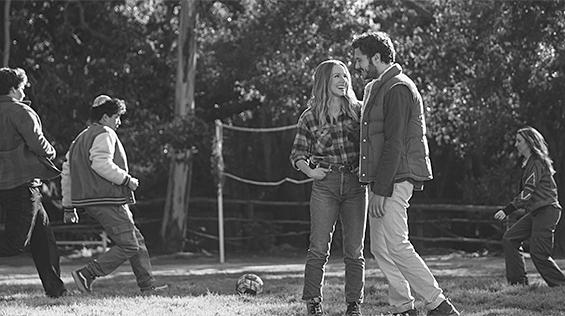
Viewers learn that, unlike Catholic priests, rabbis can have sex; Jews do not cross themselves; that the word “shalom” has three meanings; that Pirate’s Booty is kosher but prosciutto definitely isn’t; and that saving a dog can be a mitzvah. They learn that Shabbat can “pop up” anywhere, observant Jews refrain from using technology during it, and that it concludes with the ritual of havdalah. The script explains that the “shvitz” is a sauna, and that Noah could marry two gay people in his synagogue if both are Jewish.
(Is Noah a Conservative rabbi? His approach to performing intermarriage is in line with the movement’s standards, and the prayer books Lev Shalem and Sim Shalom, both Conservative movement publications, are displayed on the sanctuary table. But other signifiers, including his approach to Shabbat observance, suggest that he could be a Reform rabbi. Denomination doesn’t seem essential in the world of Nobody Wants This.)
A reference to pious Jews having intercourse through a hole in a sheet, which is a myth even in the most observant communities, is an exception to an otherwise factual and celebratory presentation of Jewish life.
What makes the series most successful is the portrayal of a
strong Jewish male character whose life is committed to making Judaism accessible. Historically, rom-coms have downplayed characters’ authentic Jewishness and conformed to traditional gender roles. So it’s a refreshing display of positive Jewish masculinity when Noah lights Shabbat candles and says the blessing. Illustrating a new generation of rabbis, his sermon sends an inclusive message that resonates with Joanne despite her lack of familiarity with Judaism or belief in God. His basketball team is called The Matzah Ballers and he makes the three-point corner shot.
And when he explains his niece becoming bat mitzvah, he dispels the idea that the party’s theme is central. “A bat mitzvah is a very important rite of passage, and it’s about standing on the shoulders of powerful Jewish matriarchs like Leah and Ruth,” he says. “And, you know, Ruth didn’t start out as a Jew, but we love her.”
While the show bears some resemblance to the 2000 film Keeping the Faith, starring Ben Stiller as Rabbi Jake Schram, the handling of the conversion topic is far more explicit. Whereas Rabbi Schram learns belatedly that his beloved has been secretly studying with a rabbi, Rabbi Rocklov broaches the subject directly, asking Joanne if she would ever consider converting. Nobody Wants This is groundbreaking by portraying not just the rabbi’s quandary as a model for Jewish continuity, but also the decision-making process and journey of the woman of another faith background. In doing so, it dismantles the odious aphorism that “shiksas are for practice.”
So while some viewers have been correct in pointing out moments of cringe, I believe that Nobody Wants This deserves high praise for giving Jewish audiences a glimpse behind the “other” curtain and giving mainstream audiences the opportunity to learn about modern Jews and Judaism — in a way that casually celebrates the richness of our tradition and the way we live within it. Considering the state of the world and antisemitism today, Nobody Wants This is a timely series. I’m hoping for a second season.
Keren R. McGinity is the director of intermarriage engagement and inclusion at the United Synagogue of Conservative Judaism and the author of Marrying Out: Jewish Men, Intermarriage, and Fatherhood.
The views and opinions expressed in this article are those of the author and do not necessarily reflect the views of JTA or its parent company, 70 Faces Media.
I’m Haitian and Jewish. I refuse to have my identities be weaponized.
RACHEL LAFOREST
The right-wing incitement against immigrants in Springfield, Ohio, shows the importance of solidarity | JTA
Over the past two weeks, with their poll numbers sinking and desperation setting in, MAGA Republicans launched a brazenly racist campaign targeting Haitian immigrant communities in Springfield, Ohio. Their propaganda has lit a match under white supremacist forces in the small town and beyond, resulting in Proud Boys marching through its streets, children staying home after bomb threats targeted their school and local Haitian businesses shutting down due to threats.
I bring a unique perspective to this issue as the child of both Haitian and Jewish parents who worked tirelessly for community safety and democracy here in the United States. These horrific scenes recall some of the darkest chapters of my Jewish history. It’s no accident that some labeled what was happening in Springfield as a “pogrom,” the term originating from mob violence against Jews in the Russian Empire.
strengthen, and a seemingly ceaseless battle with a vicious dictator. For more than a decade, he’d worked across class, religious and cultural differences, banded together, in solidarity, with his siblings, friends and neighbors, to fight for communities and a country where families could be safe and thrive.

Because of the racism, greed and constant quest for power under the dictatorship, with his life being threatened, he was forced to leave for safety in the United States. Under related circumstances, 200,000 other Haitians call the United States home under the Temporary Protected Status, granted by the Department of Homeland Security, to those who cannot safely return home.
My parents successfully fought for labor unions and built one of the most powerful tenants’ associations in the nation. They knew they couldn’t do it alone. Their success is owed to the coalition they built with their Haitian, Jewish, Italian, Irish, Puerto Rican and Indian immigrant neighbors. They knew that their unity wasn’t just for unity’s sake. It was strategy.
That’s why it was so disturbing to read the words of Cary Kozberg, Springfield’s only rabbi, last week, taking aim at Haitian residents as lacking “Western civilized values.” Not only do these words — which Kozberg recanted after a backlash — stand directly at odds with Jewish leaders in Ohio who said they support the Haitian community — they also belie a fundamental misunderstanding of the Haïtian community in this country as well as the roots and machinery of antisemitism and racism.
I learned early on that racism and antisemitism are intimately linked, two sides of the same ugly coin used together to stoke fear and spread lies.
My parents worked tirelessly for community safety and democracy here in the United States. My father fled his cherished homeland, Haïti, in his early 20s, leaving behind beloved family and friends, organizations he’d helped build and
The extremist forces behind the Springfield attacks know that they can only succeed with division. They employ the machinery of antisemitism and racism to distract from the root causes of our collective struggles and turn us against each other.
I walk in the footsteps of my parents, having worked with unions like my dad, and grassroots efforts like my mom. And I’ve also set out my own way, co-leading the largest domestic policy group organizing Jews against these attempts to divide us from our communities. I know the machinery of racism and antisemitism can be slowed down at the ballot box, and that it can be broken with solidarity.
Rachel Laforest is Chief Program Officer at Bend the Arc: Jewish Action.
The views and opinions expressed in this article are those of the author and do not necessarily reflect the views of JTA or its parent company, 70 Faces Media.
B’NAI ISRAEL SYNAGOGUE
618 Mynster Street Council Bluffs, IA 51503-0766
712.322.4705 www.cblhs.org
BETH EL SYNAGOGUE
Member of United Synagogues of Conservative Judaism 14506 California Street Omaha, NE 68154-1980
402.492.8550 bethel-omaha.org
BETH ISRAEL
SYNAGOGUE
Member of Union of Orthodox Jewish Congregations of America 12604 Pacific Street Omaha, NE. 68154
402.556.6288
BethIsrael@OrthodoxOmaha.org
CHABAD HOUSE
An Affiliate of Chabad-Lubavitch 1866 South 120 Street Omaha, NE 68144-1646
402.330.1800 OChabad.com email: chabad@aol.com
LINCOLN JEWISH COMMUNITY:
B’NAI JESHURUN
South Street Temple
Union for Reform Judaism
2061 South 20th Street Lincoln, NE 68502-2797
402.435.8004 www.southstreettemple.org
OFFUTT AIR
FORCE BASE
Capehart Chapel 2500 Capehart Road Offutt AFB, NE 68123
402.294.6244 email: oafbjsll@icloud.com
TEMPLE ISRAEL
Union for Reform Judaism (URJ) 13111 Sterling Ridge Drive Omaha, NE 68144-1206
402.556.6536 templeisraelomaha.com
LINCOLN JEWISH COMMUNITY:
TIFERETH ISRAEL
Member of United Synagogue of Conservative Judaism 3219 Sheridan Boulevard Lincoln, NE 68502-5236 402.423.8569 tiferethisraellincoln.org
Kol Nidre Service, Friday, Oct. 11, 7:30 p.m. with guest speaker, Gail Krasne Kenkel, speaking about life growing up in Council Bluffs and at B’nai Israel; Yom Kippur Morning Service, Saturday, Oct. 12, 10:30 a.m. with guest speaker, Stephanie Olson, discussing her project on human trafficking, Set Me Free Project Services led by Jeff Taxman. Everyone is welcome.
Monthly Speaker Series Service, Friday, Nov. 8, 7:30 p.m. with our guest speaker. Our service leader is Larry Blass. Everyone is always welcome at B’nai Israel! For information about our historic synagogue, please visit our website at www.cblhs.org or contact any of our other board members: Renee Corcoran, Scott Friedman, Rick Katelman, Janie Kulakofsky, Howard Kutler, Carole and Wayne Lainof, Ann Moshman, MaryBeth Muskin, Debbie Salomon and Sissy Silber. Handicap Accessible.
Services conducted by Rabbi Steven Abraham and Hazzan Michael Krausman.
IN-PERSON AND ZOOM MINYAN SCHEDULE:
Mornings on Sundays, 9:30 a.m.; Mondays and Thursdays, 7 a.m.; Evenings on Sunday-Thursday, 5:30 p.m.
FRIDAY: Kol Nidre, 6:15 p.m. at Beth El & Live Stream.
SATURDAY: Yom Kippur Family Service, 9 a.m.; Yom Kippur Morning Service, 9:30 a.m. at Beth El and Live Stream; Yom Kippur Study Session One, 3:30 p.m. with Sharon Brodkey;Yom Kippur Study Session Two, 4:30 p.m. with Rabbi Steven Abraham; Mincha/Ne’ila, 5:30 p.m. at Beth El & Live Stream; Community Break Fast, 7:30 p.m.
SUNDAY: Morning Minyan, 9 a.m. Zoom Only.
TUESDAY: Board of Trustees Meeting, 7 p.m.
WEDNESDAY: BESTT (Grades 3-7), 4:15 p.m.; Erev Sukkot Evening Service, 5:30 p.m. at Beth El & Live Stream.
THURSDAY: Sukkot Day One Morning Service, 10 a.m. at Beth El & Live Stream; Sukkot Day One Evening Service, 5:30 p.m. at Beth El & Live Stream.
FRIDAY-Oct. 18: Sukkot Day Two Morning Service, 10 a.m. at Beth El & Live Stream followed by Soup in the Sukkah; Kabbalat Shabbat, 6 p.m. at Beth El & Live Stream.
SATURDAY-Oct. 19: Sukkot/Shabbat Morning Services with Yizkor, 10 a.m. at Beth El and Live Stream; Jr. Congregation (Grades K-12), 10 a.m. Havdalah, 7:10 p.m. at Beth El & Zoom. Please visit bethel-omaha.org for additional information and service links.
FRIDAY: Nach Yomi, 6:45 a.m.; Shacharit, 7 a.m.; Mincha, 4:45 p.m.; Nidre/Ma’ariv/Fast Begins, 6:30 p.m.; Candlelighting, 6:31 p.m.
SATURDAY: Yom Kippur; Shacharit, 9 a.m.; Tot Shabbat 10:30 a.m.; Youth Class 10:45 a.m.; Neilah Class, 5 p.m.; Mincha 5:30 p.m.; Neilah, 6:30 p.m.; Fast Ends, 7:28 p.m.; Havdalah, 7:29 p.m.
SUNDAY: Shacharit 9 a.m.; Kinyan 9:40 a.m.; Beth Israel Sukkah Decorations, 10:30 a.m.; Mincha/ Ma’ariv, 6:30 p.m.
MONDAY: Nach Yomi 6:45 a.m.; Shacharit 7 a.m.; Mincha/Ma’ariv, 6:30 p.m.
TUESDAY: Nach Yomi, 6:45 a.m.; Shacharit, 7 a.m.; Kinyan, 5:55 p.m.; Mincha/Ma’ariv 6:30 p.m.
WEDNESDAY: Erev Sukkot; Nach Yomi, 6:45 a.m.; Shacharit, 7 a.m.; Candlelighting/Mincha/Ma’ariv,
6:23 p.m.
THURSDAY: Sukkot; Shacharit, 7 a.m.; Mincha/ Ma’ariv, 6:20 p.m.; Candlelighting, 7:21 p.m.
FRIDAY-Oct. 18: Sukkot; Shacharit, 9 a.m.; Sukkot Lunch (by registration only), 11:30 a.m.; Candlelighting, 6:20 p.m.; Mincha/Kabbalat Shabbat, 6:30 p.m.
SATURDAY-Oct. 19: Shabbat Kollel, 8:30 a.m.; Shacharit, 9 a.m.; Tot Shabbat, 10:30 a.m.; Youth Class 10:45 a.m.; Tehillim, 5:15 p.m. at the Zivs; Soulful Torah, 5:25 p.m. with Rabbi Geiger; Mincha, 6:10 p.m.; Kids Activity/Laws of Shabbos, 6:40 p.m.; Havdalah, 7:18 p.m.
Please visit orthodoxomaha.org for additional information and Zoom service links.
All services are in-person. All classes are being offered in-person and via Zoom (ochabad.com/academy). For more information or to request help, please visit www.ochabad.com or call the office at 402.330.1800.
FRIDAY: Morning Services 8 a.m.; Fast & Candlelighting, 6:31 p.m.; Kol Nidrei, 7 p.m.
SATURDAY: Morning Services 9:30 a.m.; Yizkor Memorial Service, 11 a.m.; Afternoon Services, 5:30 p.m.; Neilah Closing Service, 6:30 p.m.; Shabbat/Holiday/Fast Ends, 7:28 p.m.
SUNDAY: Sunday Morning Wraps, 9 a.m.; Sinai Scholar’s Week #4, noon.
MONDAY: Shacharit 8 a.m.; Personal Parsha, 9:30 a.m.; Intermediate Biblical Hebrew Grammar, 10:30 a.m. with Prof. David Cohen; Parsha Reading, 6 p.m. with Prof. David Cohen; Translating Words of Prayer, 7 p.m. with David Cohen.
TUESDAY: Shacharit 8 a.m.; Translating Words of Prayer, 11 a.m. with David Cohen; Intermediate Biblical Hebrew Grammar, 6 p.m. with Prof. David Cohen; Introductory Biblical Hebrew Grammar, 7 p.m. with Prof. David Cohen.
WEDNESDAY: Shacharit 8 a.m.; Mystical Thinking (Tanya), 9:30 a.m.; Introductory Biblical Hebrew Grammar, 10:30 a.m. with Prof. David Cohen; Parsha Reading, 11:30 a.m. with Prof. David Cohen; Candlelighting, 6:23 p.m.
THURSDAY: Morning Services, 10 a.m. followed by Kiddush Lunch; Candlelighting after, 7:21 p.m.
FRIDAY-Oct. 18: Morning Services, 10 a.m. followed by Kiddush Lunch; Candlelighting before, 6:20 p.m.
SATURDAY-Oct. 19: Morning Services, 9:30 a.m.; Shabbat Ends, 7:17 p.m. Services facilitated by Rabbi Alex Felch.
LINCOLN JEWISH COMMUNITY: B’NAI JESHURUN & TIFERETH ISRAEL
All services offered in-person with live-stream or teleconferencing options.
FRIDAY: Kol Nidre Joint Service, 6:30-8:30 p.m. led by Rabbi Alex at TI; Shabbat Candlelighting, 6:33 p.m.
SATURDAY: Yom Kippur Jr Congregation, 9 a.m. led by Rabbi Alex at TI;Yom Kippur Morning Service, 9:30 a.m. followed by Yizkor led by Rabbi Alex at TI; Yom Kippur Morning, 10 a.m. led by Sarah Kelen at SST; Torah Study, noon via Zoom; Yom Kippur Afternoon Service, 3 p.m. led by Rabbi Alex at SST; Yizkor, 4 p.m. led by Rabbi Alex at SST; N'ilah, 5 p.m. led by Rick Kohn at SST; Mincha, 5 p.m. led by Rabbi Alex and followed by Neilah, Maariv, Havdalah and a Congregational catered Break the Fast at TI; Congregational Potluck Break the Fast, 6 p.m. at SST;
RABBI BENJAMIN A. SHARFF
Senior Rabbi, Temple Israel
The horrific terror attacks of Oct. 7th continue to reverberate throughout both the Jewish world and the larger world. On October 8th our prayer was, Dayeinu we would grieve those who perished and embrace the return of all of the hostages. Sadly, we know this did not happen. Instead, more violence erupted. Antisemitism spread like wildfire. Places we felt safe and welcomed turned against us. And some in our own community struggle with feeling at home within the confines of our own walls. But this does not have to be the end of our story. The cycles of violence and
Havdalah, 7:31 p.m.; HHD Food Drive! Barrels are set up both at SST and TI. Donations will be accepted through Simchat Torah.
SUNDAY: Men’s Bike/Coffee Group, 10:30 a.m. at The Mill on the Innovation Campus. For more information or questions please email Al Weiss at albertw801@gmail.com; Pickleball, 3-5 p.m. at TI. Anyone interested in playing or learning how to play can text Miriam at 402.470.2393. If there are enough interested people; we’ll play in the Social Hall.
WEDNESDAY: Men’s Lunch Group, 12:15 p.m. at Roberts Park (weather permitting). We meet every other Wednesday. Please contact albertw801@ gmail.com to get on the mailing list. As plans can change the last minute and it is necessary to contact everyone. Bring lunch, a drink and a chair
THURSDAY: Synagogue Offices Closed for Sukkot. FRIDAY-Oct. 18: Synagogue Offices Closed for Sukkot Day Two; Shabbat Candlelighting, 6:13 p.m.; Kabbalat Shabbat Service, 6:30-7:30 p.m. led by Rabbi Alex at SST
SATURDAY-Oct. 19: Sukkot Day Three; Shabbat Service, 9:30-11 a.m. led by Rabbi Alex at TI; Torah Study, noon led by TBD via Zoom; Potluck Dinner and Family Game Night, 6 p.m. at SST. Adults and kids of all ages are welcome. Please bring a dish to share; Havdalah, 7:21 p.m.
FRIDAYS: Virtual Shabbat Service, 7:30 p.m. every first and third of the month at Capehart Chapel. Contact TSgt Jason Rife at OAFBJSLL@icloud.com for more information.
In-person and virtual services conducted by Rabbi Benjamin Sharff, Rabbi Deana Sussman Berezin, and Cantor Joanna Alexander.
FRIDAY: Drop in Mah Jongg, 9-11 a.m. In-Person; Village Walking Group, 10 a.m. In-Person; Kol Nidre, 7:30 p.m. In-Person & Zoom.
SATURDAY: Tot Yom Kippur Service, 9:30 a.m. InPerson; Sitter Service for Children age 0-4, 10 a.m. In-Person; Yom Kippur Morning Service with Torah Reading, 10:30 a.m. In-Person & Zoom; Youth Programming, 10:30 a.m. In-Person; Feeding the Hungry: Food Packing, 12:15 p.m. In-Person; Ask Rabbi Sharff, 1:45 p.m. In-Person & Zoom; A Service of Healing, 3 p.m. In-Person & Zoom; Yizkor, 4:15 p.m. InPerson & Zoom; N’ilah, 5 p.m. In-Person & Zoom; Break the Fast, 6 p.m. In-Person.
TUESDAY: Adult Prayer Hebrew: Level Bet, 6 p.m. In-Person.
WEDNESDAY: Yarn It, 9 a.m.; Grades 3-6, 4:30 p.m. In-Person; Hebrew High: Grades 8-12 6 p.m. InPerson; Reproductive Rights Task Force Events in partnership with Protect Our Rights Ballot Initiataive, 6 p.m. In-Person.
THURSDAY: Sukkot Service, 10:30 a.m. In-Person & Zoom.
FRIDAY-Oct. 18: Drop in Mah Jongg, 9-11 a.m. InPerson; Village Walking Group, 10 a.m. In-Person; Tot Shabbat, 5:45 p.m. In-Person; Classic Shabbat Service, 6 p.m. In-Person & Zoom; Oneg in the Sukkah, 7 p.m. In-Person.
SATURDAY-Oct. 19: Torah Study, 9:15 a.m. In-Person; Shabbat Morning Service and Bat Mitzvah of Kori Lucoff 10:30 a.m. In-Person & Zoom; Sushi in the Sukkah with the 20-Somethings, 6:30 p.m. In-Person. Please visit templeisraelomaha.com for additional information and Zoom service links.

recrimination are not the only way. We are a people who live on hope. Hope for a better day. Hope for a better world. Hope for peaceful co-existence. Hope for a better tomorrow.
Until that day comes, may we find comfort in community and in the embrace of loving friends and family. Until that day, we await the return of the hostages and the end of the hostilities. Until that day we pray for all those who are suffering as we grieve our beloved and sacred dead. Until that day, we know that one day peace will reign upon the land, and in the words of Isaiah, our prophet, all shall live under their own vine and fig tree and none shall be afraid.
LAINEY JOY GOLDENBERG
Becca and Andy Goldenberg of Los Angeles, announce the July 8, 2024, birth of their daughter, Lainey Joy.
She is named for maternal great-grandfather, Leonard and maternal great-grandmother, Phyllis Joy Friedel.
She has a brother, Payton James (age 4).
Grandparents are Lynne (Friedel) and Steve Gellman, Austin, TX, and Gail Goldenberg of Los Angeles and Jeffrey Goldenberg of blessed memory.
KORI LUCOFF
Kori Lucoff, daughter of Lisa and Chuck Lucoff will celebrate her Bat Mitzvah on Saturday, Oct. 19, 2024, at Temple Israel.
Kori is a seventh grade Honor Roll student at Elkhorn Valley View Middle School.
Her interests include basketball, softball, traveling and spending time with her friends. She also attends Camp Sabra which she refers to her home away from home.
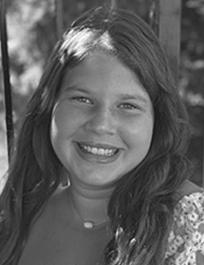
For her Mitzvah Project, Kori volunteered at Heartland Hope Mission where she helped sort food, clothing and hygiene items for families in need. She also helped clean up from the devastating tornado which hit communities in Omaha and collected clothes and other items for a family who lost their home.
She has a sister, Makayla (15).
Grandparents are Suzy and Norm Sheldon of Omaha and Dena and the late Mark Lucoff of Milwaukee, WI.
If you received the Chabad holiday guide, please note on page 11 that the blessing for candlelighting for Yom Kippur was quoted incorrectly. The blessing should be Baruch ata... ....Asher kideshanu bemitzvotav vetzivanu lehadlik ner shel Shabbat vshel Yom hakippurim.
ALAN EDWARD POTASH
Alan Edward Potash passed away unexpectedly on Sept. 22, 2024, at age 64 in Palm Springs, California. Services were held on Sept. 26, 2024, at Beth El Synagogue in Omaha.
He was preceded in death by his father, Merle Potash.
He is survived by his loving wife of 34 years, Amy Nachman; sons, Ezra Potash and Adeev Potash; mother, Ruth Potash; sisters, Jane Murow and Julie Potash, in addition to many other family members.
Alan was the CEO of the Jewish Federation of the Desert in Palm Springs. Prior to his work in Palm Springs, he was the CEO of the Jewish Federation of Omaha, Nebraska, for six years. Alan stood for fighting antisemitism; social injustice, and advocated for many Jewish causes. A remarkable human with incredible dedication to his family, friends, community, and all good things in the world. He will be missed by so many who were influenced by his commitment to righteousness.
The family will be creating an endowment to honor Alan’s life and legacy in the Omaha Jewish Community. Donations can be sent to the Jewish Federation of Omaha Foundation in memory of Alan Potash.
Harlan Lewis Rips passed away on Sept. 26, 2024, at age 73. Services were held on Sept. 29, 2024, at Temple Israel, 13111 Sterling Ridge Drive.
He is preceded in death by his parents, Barbara and Norman Rips.
He is survived by his wife, Jane; and daughters, Sara and Anne; brothers, Lance (Julie Johnson), Michael (Sheila Berger) and Bruce Rips.
Harlan was born and lived in Omaha. He was a proud graduate of Omaha Central High School and Columbia University. His life work was his family's business, Commercial Optical Company. Harlan was known for his intellect and sharp wit. He took great delight in his life-long friendships, including friends from grade school, camp, NFTY and college.
Memorials may be made to Temple Israel, 13111 Sterling Ridge Drive, Omaha, NE 68144.
ANNETTE VAN DE KAMP-WRIGHT
Jewish Press Editor
We are pleased to announce ‘Write With Us,’ the recent collaboration between the Nebraska Jewish Historical Society and the Jewish Press, will continue in smaller format in the Fall. New workshops are scheduled for Nov. 21, Dec. 19, Jan. 16, Feb. 2, March 20 and April 17 in the Noshery at the Staenberg Omaha JCC. Register by contacting Jessi at jtaylor@jewishomaha. org or Annette at avandekamp@jewishomaha.org. There is no cost to attend, although donations are always welcome.
If you have wanted to write your family’s story, that great American novel, or you have always wanted to try your hand at poetry, join us! Maybe you are already an accomplished writer, but you would benefit from being in a room with other writers. Perhaps you have convinced yourself you can’t write at all, but would love to try. Everyone, from absolute beginner to professional, is welcome to attend.

Announcements may be e-mailed to the Press at jpress@jewishomaha.org; or mailed to 333 So. 132 St., Omaha, NE 68154. Readers can also submit announcements -- births, b’nai mitzvahs, engagements, marriages, commitment ceremonies or obituaries -- online at www.omahajew ishpress.com/site/forms/. Deadlines are normally nine days prior to publication, on Wednesdays, 9 a.m. Please check the Jewish Press, for notices of early deadlines.



ATTENTION ADVERTISERS! For $225/25 word classified you can advertise in over 150 Nebraska newspapers. For more information contact the Jewish Press or call 1-800-369-2850.
HELLO NEBRASKA! Introducing www.nepublicnotices.com, a new public notice website presented as a public service by all Nebraska newspapers. Free access, fully searchable – because democracy depends upon open government and your right to know.
AFFORDABLE PRESS Release service. Send your message to 155 newspapers across Nebraska for one low price! Call 1-800-3692850 or www.nebpress.com for more details.
FALL CRAFT Show. October 12, 9 a.m. - 2 p.m. Sutton Community Center, 200 S. Saunders, Sutton. Lots of great vendors, clothing boutique, food trucks. Special guest, Bluey, 11 a.m - noon.
STROKE AND Cardiovascular disease are leading causes of death, according to the American Heart Association. Screenings can provide peace of mind or early detection! Contact Life Line Screening to schedule your screening. Special offer - 5 screenings for just $149. Call 1-844-893-8016.
PORTABLE OXYGEN Concentrator? May be covered by Medicare! Reclaim independence and mobility with the compact design and long-lasting battery of Inogen One. Free information kit! Call 855385-3580.
PREPARE FOR power outages today with a Generac Home Standby Generator. Act now to receive a FREE 5-Year warranty with qualifying purchase. Call 1-402-899-2584 today to schedule a free quote. It’s not just a generator. It’s a power move.
DOES YOUR basement or crawl space need some attention? Call Thrasher Foundation Repair! A permanent solution for waterproofing, failing foundations, sinking concrete and nasty crawl spaces. FREE Inspection & Same Day Estimate. $250 off ANY project with code GET250. Call 1-844-958-3431.
ELIMINATE GUTTER cleaning forever! LeafFilter, the most advanced debris-blocking gutter protection. Schedule a FREE LeafFilter estimate today. 20% off Entire Purchase. Plus 10% Senior & Military Discounts. Call 1-855-671-2859.
THE BATHROOM of your dreams in as little as 1 day. Limited Time Offer - $1000 off or No Payments and No Interest for 18 months for customers who qualify. BCI Bath & Shower. Many options available. Quality materials & professional installation. Senior & Military Discounts Available. Call Today! 1-855-451-224
BECOME A Published Author. We want to Read Your Book! Dorrance Publishing-Trusted by Authors Since 1920 Book manuscript submissions currently being reviewed. Comprehensive Services: Consultation, Production, Promotion and Distribution Call for Your Free Author’s Guide 1-877-858-2822 or visit dorranceinfo.com/ Nebraska.
HAL SENAL
Sometimes, you’ve just got to laugh.
To paraphrase an iconic literary opening line, it was the best of times during the worst of times.
After the horrific, brutal Oct. 7 Hamas attacks in Israel and the swift and sustained retribution that has since followed in its wake, the Jews of this country and those all over the globe are now facing more waves of antisemitic hatred and hostility than any in recent memory.
However, the men and women of Chabad House Omaha, were ready to laugh in the face of adversity, a soothing balm to the seemingly endless onslaught of violence targeted against the Jewish people.
With that said, the men and women of the Chabad House of Nebraska sure do know how to put on a show, offering some laughs while creating solidarity among the Jewish friends and families that came together for a night of comic relief.
And on Thursday, Sept. 19, at the Omaha Funny Bone, that’s exactly what happened.
The full house, with a final headcount of at least 250 people, was brought down by uproarious laughter.
The hilarious Sklar Brothers (consisting of twins Jason and Randy, dual lightning rods of manic Jewish comic energy) made a gallant attempt to release the proverbial pressure valve of anxiety and geopolitical unrest that seems to be infecting many Jews in America.
For nearly two hours, there were no heated debates, no choosing sides, no mentions of politics, or grandstanding.
Rabbi Eli Tenenbaum of Chabad House who explained, the reasoning for holding a comedy show amid such endless and senseless violence against our people.
“So, it was a combination of a few things,” outlined Rabbi Tenenbaum. “One of them was to throw an event that would get members of the Jewish community together with joy and laughter and fun. This is the second year we’ve done it, and it’s planned to be an annual event, specifically before Rosh Hashanah, to get everybody in the mood; and even though comedy doesn’t seem like the appropriate venue, I think it’s very appropriate, in the sense of just giving people, letting people have that joy – the joy that Judaism has [to offer].”
One of the evening’s guests at the event, Lloyd Roitstein, emphasized the importance of community gathering, particularly for Jewish people, to escape from world issues, while also rallying behind and supporting Israel.
“Number one, anything to support Chabad is great,” explained Roitstein. “Number two, it’s good to come together with a whole bunch of the [Jewish] community and laugh with them, not have to worry about the world’s issues and have a good night. Nothing beats laughter – it the best medicine there is. It’s good to go to something and have fun and still support [Israel]. You’ve still got to live




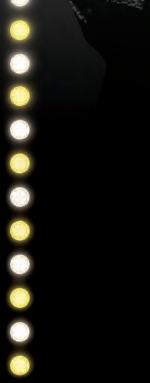
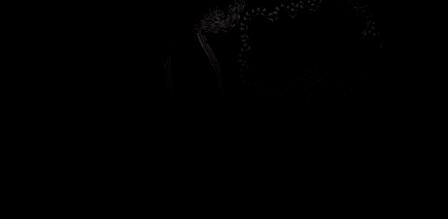

your life. They want us to curtail our stuff; so, we’ve got to go on, and be positive, and support Israel.
Another guest, Gary D. Epstein, also came out to support of Chabad, while taking in a few yucks along the way.
“I’m a great supporter of Chabad,” expressed Epstein. “I think it’s wonderful. They’re great teachers, and it’s important to support them.”
Even the brothers Sklar, originally from St. Louis, MO, were unable to help but gush about comedy, the Omaha Jewish community, and the importance of holding positive events such as the one held that evening.
“We’ve had a connection to the Omaha Jewish Community, because we grew up in St. Louis, [which is] very near, so it feels like home for us in a lot of ways, so there’s that,” said the brothers, occasionally finishing each

other’s sentences. “It’s so important to come together for something purely fun and positive and support a good organization, like the Chabad organization. So, when we have a chance to do something like that, we jump on it. So that’s why we’re here.”
When asked what his favorite moment of the evening was, Rabbi Tenenbaum offered up a three-way tie.
“There were so many,” exclaimed Rabbi Tenenbaum. “I’m gonna give three, if that’s ok. One personal favorite was walking in. I was kind of in and out of the main room of the outside; and when I walked in, right before the show actually started, [I saw] how full the room was. That was a great moment! [My] second favorite moment was in the comedy itself; a bit about Jews in Nebraska getting a way to turn on your tractor. The third one was on the way out, enjoying peoples’ faces and [seeing] the excitement and fun on them.”
In the end, however, Rabbi Tenenbaum’s wife, Mushka, perhaps summed up the appeal of such an event, in an email correspondence. She explained the importance of embracing times of happiness, light, and laughter above all.
“The goal of the night [was] to get together before the high holidays and get into it with joy and excitement,” explained Mrs. Tenenbaum via e-mail. “Many people dread this time of year, but in fact, it’s a great occasion.” Thanks! You’ve been a great audience! Tip your wait staff.




















































